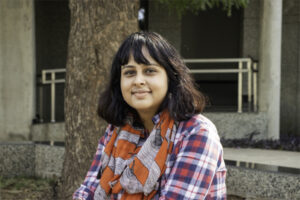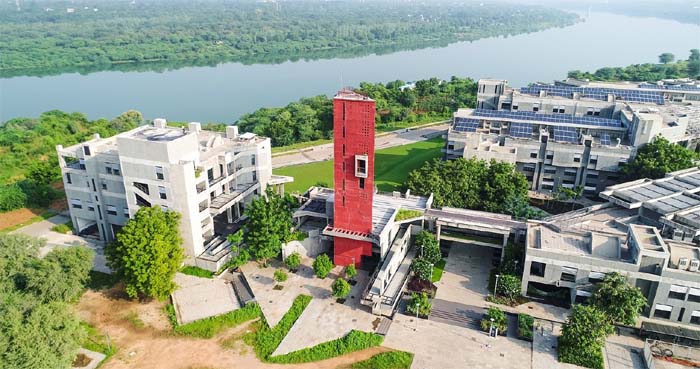- Ahana Ghosh, a PhD scholar of Humanities and Social Sciences, working on dietary and ritual practices of ancient Harappans, is going to advance her research on adaptive subsistence, exploitation of local and non-local resources, and vessel form and function in the Harappan society at the Department of Anthropology, University of Pennsylvania, USA
- Shruti Singh, a PhD scholar of Computer Science and Engineering, working on Natural Language Processing and Deep Learning techniques, will be exploring the possibilities of AI-assisted technology to make scientific texts such as research papers and peer-reviews machine-readable and comprehensible at Yale University, USA
NE EDUCATION BUREAU
GANDHINAGAR, MAY 4
Opening new frontiers of research, two PhD scholars of the Indian Institute of Technology Gandhinagar (IITGN), Ahana Ghosh and Shruti Singh, have won the coveted Fulbright-Nehru Doctoral Research Fellowship 2023-24. The esteemed fellowship, instituted by the United States-India Educational Foundation (USIEF), Fulbright Commission in India, is awarded only to a handful of candidates every year after a rigorous review process. Combined with cross-cultural student diversity, this fellowship enables the awardees to cross-fertilise ideas, tackle challenging research problems, and develop deployable impactful solutions.

Ahana Ghosh, a PhD scholar in the Humanities and Social Sciences discipline at IITGN, is currently working on dietary and ritual practices of ancient Harappans under the guidance of Prof Sharada C V. During her Fulbright tenure, she will be working at the Department of Anthropology, University of Pennsylvania, USA, under the supervision of Prof Kathleen Morrison, focusing on the foodways of ancient Harappans from some of the selected settlements located subsequently within the Western and Northwestern parts of India. Through her study, she aims to explore diet and ritual practices by analysing the biomolecular components lying in the organic residues within ceramics used by the inhabitants of these settlements. Dietary studies are still in the embryonic phase in South Asian archaeology. Thus, conventional ceramic studies must be reassessed and augmented with the latest scientific methodologies and different nuances of ‘food anthropology’ and ‘cultural ecology’ to develop a broader view of ancient foodways. Mortuary food is another crucial aspect of her research, and she aims to examine vessel residues found as grave goods in the Harappan cultural topography.
Ahana’s previous work on the ceramics from excavated settlements in Gujarat, both habitational and burial, has demonstrated a good presence of lipids, pointing to some individual dietary sources well enough to take up this research on a broad scale. Moreover, her food ethnographic survey on the communities residing in the Kutch region has highlighted the different trajectories of the region’s culinary landscape and people’s interaction around food.
Expressing her thoughts on this accomplishment, Ahana Ghosh shared, “This scholarship is a great encouragement for me to take up this research on a large scale and would give me an unprecedented platform to share the ancient voices of food with greater academia. I heartily thank Prof Sharada, other faculties from the Archaeological Sciences Centre, and IITGN, who have played a key role in shaping my Fulbright dreams. I am looking forward to working with Prof Morrison.”

Shruti Singh, a PhD scholar in the Computer Science and Engineering discipline at IITGN, whose PhD research at IITGN under the guidance of Prof Mayank Singh focuses on developing tools with Natural Language Processing and Deep Learning techniques that assist researchers at various stages of the research cycle and expedite the process of knowledge discovery, will be going to Yale University, USA, to work with Prof Arman Cohan. She will be working on making scientific texts such as research papers and peer-reviews machine-readable and comprehensible. The aim is to accelerate scientific progress by training models to assist researchers in understanding research papers efficiently and effectively.
Current models use only the title and abstract of a paper and lack in-depth knowledge about research papers. Models like ChatGPT often hallucinate and generate incorrect information. Such models are unreliable for reading research papers. Through her research, Shruti proposes to develop models that utilise the full text of the paper, are capable of distinguishing between different aspects of it, and can generate text based on reliable knowledge.
Sharing her excitement, Shruti Singh said, “I am thrilled to embark on this wonderful opportunity and explore the possibilities of AI-assisted technology for research paper comprehension. I am grateful to my advisor Prof Mayank Singh for his support and guidance, my host advisor Prof Arman Cohan for agreeing to host me, and USIEF for providing this wonderful opportunity.”
As recipients of this fellowship, Ahana and Shruti will receive J-1 visa support and round-trip air travel, a monthly stipend, and accident and sickness support as per the US government guidelines. They will also have opportunities to audit non-degree courses, conduct research, and gain practical work experience.












